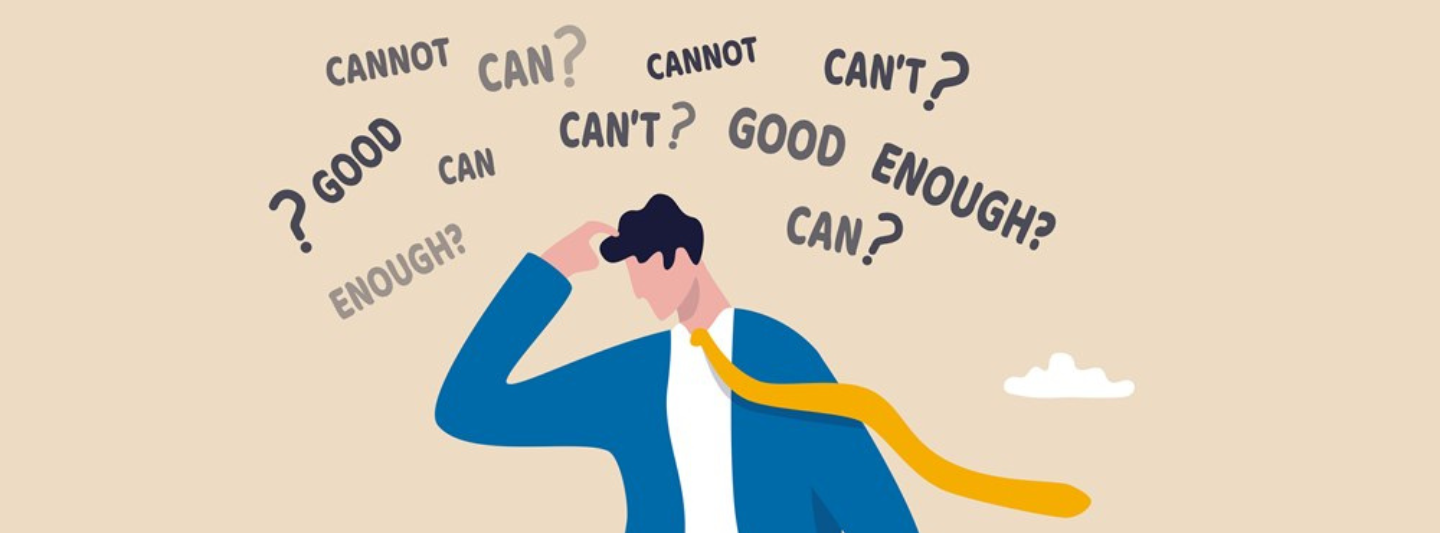
Fuelling for Performance: Expert Nutrition Tips from an Ironman Finisher & Nutritionist
Competing in an Ironman is no small feat—it demands physical endurance and a strategic approach to nutrition.

Have you always wondered about that colleague of yours who worked on everyone’s stuff silently, and you’re always amazed at their abilities to meet impossible deadlines, and yet confused by their constant denial of their abilities and how they talk about being lousy or just lucky, and that they are always nervous?
Or do you find yourself constantly second-guessing yourself even though you know you got this? You worry about keeping an alternative façade to different groups of people, at work, with your friends or in public. You fret about making mistakes even to your date or loved ones, thinking any slip-ups may cause a change in how they think about you. This is all caused by one phenomenon.
Imposter Syndrome – A psychological experience in which the person constantly doubts his or her own abilities, talents, or accomplishments and develops a persistent internalized fear of being called out as a fake.
Some characteristics arising from this phenomenon may include constant self-doubt, a tendency to devalue own contributions, disavowing own successes attributing them to external factors, self-sabotaging own successes, setting unimaginably unrealistic goals for self or others, having a persistent fear of not living up to expectations, and burnout phenomenon.
This is not a mental health disorder per se, and it does not have a checklist of criteria. But imposter syndrome is associated with features of introversion, anxiety states, a need to appear smart always, a tendency to put others down, and the person may often come from a non-supportive family background. This is not a healthy dose of humility, as some cynics may construe this to be. It’s a longstanding unhealthy internal schema of sorts when handling situations and interpersonal issues.

First coined by Clance & Imes in 1978, after the authors researched a group of a hundred ladies in the article “The Impostor Phenomenon in High Achieving Women: Dynamics and Therapeutic Intervention”. These women were formally recognised in their respective professional domains, and yet despite the external accolades, each of them was unable to acknowledge their individual victories and successes internally. Some thought it to be sheer luck, while others thought outsiders were overestimating their achievements. The authors’ account of this imposter phenomenon had arisen from a combination of having grown up in set cultural norms, having been exposed to intra-familial conditioning, or developed discordant attributional styles in these ladies or them subscribing to gender stereotypes. A lot of the research participants experienced anxiety and depression that required psychotherapy. Most lacked self-confidence, and some were frustrated in trying to reach or attain their own self-imposed standards.
What research established more than forty years ago continues to contribute to the occurrence of imposter syndrome in current times. Do you experience or fit into any of these theorized etiologies?
Intra-familial issues or the family environment.
Significant members at home or responsible adults we grow up with may have continuously unconsciously placed undue pressure on the need for us to achieve scholastically or projected harsh expectations on us in comparison with other peers.
Cultural norms or social pressure.
One’s self-worth and need for approval are closely tied to staying put in a popular group as well as changing oneself to suit the group, e.g., muting own opinion in a workplace meeting or suppressing skills in a sports team.
A sense of belonging.
Some minute differences, no matter how inconspicuous, can still blow out of proportion and make that person feel singled out. This uniqueness may be misrepresented and perpetuate the sense of being excluded, like our heritage or ethnicity, our language background, and even our gender and physical differences, also notwithstanding religion, socioeconomic status, and sexuality. Why should we suppress what’s unique to us just to “blend in”?
Attributional styles or personality.
There are some of us who tend to internalize feelings of failure, doubt, and distress in every context and scenario, to the point we use unhealthy coping ways like suppressing, denial or even dissociation.
Further research by Langford & Clance in 1993 found imposter syndrome to be an experience of feeling incompetent, as if “one had deceived other people about one’s abilities” or being a fraud. One may seek to gain their own self-esteem by trying to live up to self-made idealized images to compensate for feelings of insecurity and self-doubt. Furthermore, a person with imposter syndrome may often see themselves as being “less ill” or “I don’t deserve this”, and so, they often do not seek help until their life situations worsen or when trouble hits. Commonly, those with impostorism tell themselves … “it’s not worth getting help” … “it’s not severe, so it’s not a problem, right?”
A way to check if we may have imposter syndrome is to ask ourselves the following:

There may be different types of Imposter Syndrome. We may find ourselves harbouring mixed features, but it’s the underpinning emotions we need to work on.
Type 1: The Discounter – underpinning a sense of inadequacy; the person irrationally dismisses all semblance of achievements and positive outcomes, frequently devalues feedback from their supporters or allies, and even distrusts their judgement.
Type 2: The Expert – also underpinning the sense of inadequacy; the person self-imposes an impossible mission to know everything and anything about the work or their relationship and becomes sorely critical of self as well as others to a point it’s suffocating and unhelpful to progress anymore.
Type 3: The Natural Genius – underpinning a sense of shame of having failed, as the person is heavily reliant on their own formulaic steps to success or getting the job done at first instance. This sort of character may say things like, “oh come on, minimal effort, maximal outcome!” and is someone who dislikes being told what to do or how to do it. The person may feel offended for no reason when provided friendly feedback, gentle critique or offered help by fellow colleagues.
Type 4: The Noticer – underpinning a sense of feeling un-belonged, or rejection; in someone who scrutinizes themselves constantly either their work or personal thoughts and ruminating about the “imperfection” or “insufficiencies”, deluded into thinking they will always fail to meet the standards.
Type 5: The Perfectionist – underpinning a sense of fear of losing it or not being in control anymore; hence the person becomes constantly dissatisfied with outcomes no matter how much hard work is already put in.
Type 6: The Soloist or Rugged Individualist – underpinning a feeling of shame of having to elicit assistance or ask for help; in someone who may pride in being the “only know-all” and the “only go-to” and may fear being exposed for not knowing it all, which is really a cognitive dissonance.
Type 7: The Super Man or Woman or Hero – underpinning a fear of perceived idleness or the guilt of having time away from work for personal pleasure; hence the tendency in that person of wanting to flaunt to their peers their immense sacrifice given at the workplace (extra hours, extra load, extra meetings) to gain approval from colleagues and managers.
This article serves to teach us how to identify this phenomenon, become aware of the syndrome and learn how to make sense of our thoughts and behaviours. We don’t enjoy being negative or being entrapped in our self-moping, or constantly watching our backs. We want to enjoy the freedom of being ourselves, enjoy the mini successes at the end of each day and be who we are when facing anyone.
Therefore, we learn to manage the emotions behind each “imposter”, such as inadequacy, shame, and rejection. Take a moment to reflect and reach deeper within yourself to decide – is this truly what we want to think about ourselves?
Engage in deep breathing: inhale through our nostrils, and after a count of 1-2-3, exhale slowly through our mouth, deliberately feeling our tummy relaxing. Do this breathing exercise five to ten times each moment and take as many moments in a day as possible.
Be mindful of the content of our thoughts as we choose to respond and not to react. Easier said than done, so one way is to slow down and take a step back to reassess the evidence or the facts of that context or situation. “Did A really say this? Could it be my own guess spinning out of control? It is true that B said I have done the right thing. I should make it clearer rather than saying the opposite…” Be ready to receive constructive feedback.
Regularly make it a habit to think about your goals and express your gratitude. Be practical and set achievable small steps. Be content about where you are and how far you have come. It is okay to reset goals or realign focus. It is okay to fail.
Lastly, practise self-compassion and self-love. You are special, unique and have neat tricks up your sleeves.
Featured Contributor:

Otium Mindhealth
Dr Lui Yit Shiang
Psychiatrist
Otium Mindhealth strives to provide holistic and patient-centric care for anyone struggling with psychological distress using an evidence-based approach in a personalised manner.
Otium Mindhealth also focuses on promoting mental health awareness within the community it serves and continues to be participative and inclusive in reaching out to special groups in psychological need.
Find out more about psychiatric services available and seek professional help today.
Core Collective is home to over 100 fitness, wellness, beauty and lifestyle and medical professionals who can help you live your best life. Click here to get started today!
References
Clance, P. R., & Imes, S. A. (1978). The imposter phenomenon in high achieving women: Dynamics and therapeutic intervention. Psychotherapy: Theory, Research & Practice, 15(3), 241–247. https://doi.org/10.1037/h0086006
Langford, J., & Clance, P. R. (1993). The imposter phenomenon: Recent research findings regarding dynamics, personality and family patterns and their implications for treatment. Psychotherapy: Theory, Research, Practice, Training, 30(3), 495–501. https://doi.org/10.1037/0033-3204.30.3.495
The Secret Thoughts of Successful Women: Why Capable People Suffer from Impostor Syndrome and How to Thrive in Spite of It, Valerie Young, Crown Business, 2011